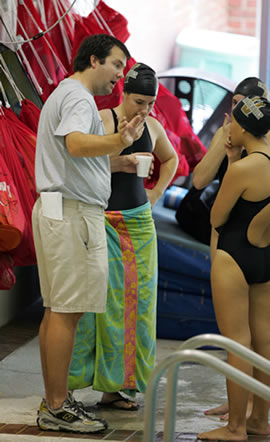Oct. 26, 2007
|
 |
|
Vanderbilt women’s swimming head coach Jeremy Organ responds to your “Ask a ‘Dore” questions submitted online earlier this week.
What is your background in swimming and why do you enjoy coaching? I started coaching at North Dakota when I graduated after swimming at that school. I enjoyed the whole process of being a coach and creating a seasoned plan. I like putting that plan into action and seeing the swimmers get better over the course of a year. I love the interactions with the kids and making a positive impact on their lives. That’s really what attracted me to stay in coaching. I coached club swimming for a while, but I really missed the college aspect of it. When the opportunity came up here to coach at Vanderbilt, I was excited to get back into the game of college swimming.
You’ve rebuilt other swimming clubs prior to Vanderbilt. Is there something about the overall challenge that motivates you? I think that anytime you build something with your own hands, it means more personally. I love the achievement. I think the same can be applied to building a program. Your finger prints are on it, and others can see the results from year to year. It gives you a lot of self-gratification. Building a program won’t happen over night. There will be times when you want everything to happen right away, but it usually doesn’t happen like that. You have to look at the big picture, be patient, and set up little goals along the way. Last year, I wanted to field a team, go out and compete, and have a good time. This season, we’ll try to get some individual wins in dual meets. You have to take little steps before you can take big ones. The program has to grow and evolve.
Do you get advice from other coaches within the conference or at Vanderbilt? I think within the coaching fraternity, any one is willing to give any advice or help along the way. I called a lot of coaches out there when I first got to Vanderbilt. A lot of coaches had built programs even if not necessarily from scratch. They all said to have patience and to have fun early on. The program needs to grow on its own, and it’ll happen. Even the coaches at Vanderbilt have been wonderful to me.
How tough is it to compete against the national championship caliber teams in the SEC? It’s very tough to gauge yearly progress because three of the top five teams in the country are in our conference. When we compare ourselves to them, it’s important to look internally on our own team. Better success will attract better athletes.
How attractive is the opportunity for a Vanderbilt education? Obviously I’m a little biased, but I believe Vanderbilt is very unique; it’s a top 20 academic institution, and we participate in the top conference in the country athletically. We offer top notch competition in the classroom and in the pool. There are only a handful of schools that can say that. As the team grows, the Vanderbilt name gets out, and as we are seen by more and more people, it’s going to become even more attractive. Nashville is a great city, and everyone that’s ever come here has absolutely loved it. We’re starting to attract some really great student-athletes.
What are the team’s goals for this season? One of the goals I set for the girls this year is to see if we could take down any previous school records set back before 1992. Some of the other goals we’ve talked about include winning an individual race, winning a relay event at a dual meet, and trying to have everyone on the team get personal bests over the course of the season.
Talk about this year’s freshman class that includes three high school All-Americans? We’ve got a great freshmen class. The three All-Americans that came in; they’ve started putting their fingerprints on the program. They’ve stepped up at times when we needed leadership in the pool. I think they’re helping to raise the day-to-day level of everyone else in practice situations. The team will be a lot stronger in the end.
How do you teach your squad mental toughness? Their training teaches them mental toughness because although swimming is a team sport, it really is an individual sport. You have to make individual progress each day. Each day, each swimmer has to try to be the best she can be. Competitive spirit has to drive a swimmer to do her best and to be better than the next swimmer beside her on the blocks.
What advice do you have for kids just getting started in swimming? I think for young swimmers getting started, make sure you’re having fun. It is kind of a lonely sport because you have your head in the water most of the time. When you’re young, don’t take it too seriously. Build yourself up as you get older. Even when I was in college, some stuff was still new to me. You have to have fun and want to be better every single day.
Do you think swimmers burnout because swimming is a sport that a lot of children get started out at such an early age? Yeah. Most swim for so long, it’s almost like after a while they forget why they do it. They should be swimming because they love the sport and love to compete. If you forget that, swimming can be boring. If there’s something at the end of the road that you’re going for, then it’s a positive experience. Everyone around you will have a positive experience.
You were a six-time All-American at the University of North Dakota. What do you remember most about those days? I remember it being a lot of fun. I had a lot of fun with the friends I made through the sport. I don’t remember the wins, loses, and the meets, but I remember having a good time with all of my friends, going on trips, training, and working our butts off every day to reach a common goal. All of the other stuff was icing on the cake. I still keep up with all of my old teammates.
Did you have that competitive edge that you knew you were going to win every time? Yeah. I knew I was going to do great because I trained myself to be the best. I prepared myself more than my opponents both physically and mentally. I have kind of a hockey background when it comes to toughness, but I enjoyed the competitiveness more than the training.
You talk about your background in hockey. Did you play hockey before you started swimming? Yes. I started playing hockey at age four. I have a pretty good number of friends that play in the NHL. I talk to them and see how our roads have gone different ways. For example, one of my friends growing up, Scott Niedermayer, has accomplished pretty much everything there is to accomplish in the world on pro hockey. He’s won a Gold Medal in the Olympics, a few Stanley Cups, and MVP awards.
Is there a reason you gave up hockey for swimming? I just wanted to try something different. At an early age, you have to make a decision what you want to do.
What was your favorite stroke to compete in and why? I really enjoyed competing in the IM events. It involves all four strokes. It’s like the iron man of swimming, especially the 400 IM. You have to swim 100 of each stroke. We find out who is the most complete swimmer. There is some gamesmanship that goes into the 400 IM. Do you back off on a certain stroke to save up energy for another stroke?
I see you’re hosting an event this year for the first time since the program restarted. I’ve never been to a swim meet. What can I expect? We have Miami (FL) coming in. In a dual meet setting, it’s a little different than what people may have experienced at a bigger setting. The meet lasts an hour and a half. The relays have a bigger outcome in the meet with a smaller number of events. Hopefully we’re competitive with Miami (FL). I haven’t seen them yet or compared matchups, but our top three or four girls should match up well with their top three or four girls. We’re really excited to have that event here because Sportsplex is one of the top facilities in the southeast. It’s going to attract a lot of teams to want to come here and swim against us.
Talk about the energy provided by the student-athletes and fans at events. It goes back to the saying, “You can’t swim from your chair.” Meets are a lot of fun to watch. It’s noisy for the amount of people that are there. It can be a great experience. People should come cheer Vanderbilt on and have fun while they’re there.
Since your team is young and growing, what is your greatest challenge in training and dryland workouts for the different experience levels? I think the biggest challenge is to make sure everyone in the pool is being challenged. There is such a wide range from the bottom tier talent to the top tier talent that you really have to make sure each group is being challenged beyond their comfort level. They need to reach beyond their comfort levels in order to reach the next training level. It can be really easy for the top group to fall into the mediocre range. Everybody needs to continue to push themselves. If a swimmer wasn’t uncomfortable at some point during the day, then I as a coach am not fully doing my job.
Do you believe in the training philosophy “buckets, weights, initial speed”? The buckets, weights, and initial speed are power orientated forms of training, but the fun part in all of that are the buckets. It’s a training device where a belt is tied around a person which is connected to a pull system that has weight connected to it. The person swims across the pool with weight attached to him or her. It’s very difficult. It’s like running with a parachute or sled with weight attached to the body. By the end, the person is spent of energy. He or she tries to get to the wall. It’s a very good tool for developing power in the water. The buckets can help a person develop strength. It gives a swimmer something different than just going back and forth all day long in the pool. Not a lot of people have buckets available to use, but it’s a very valuable tool.



